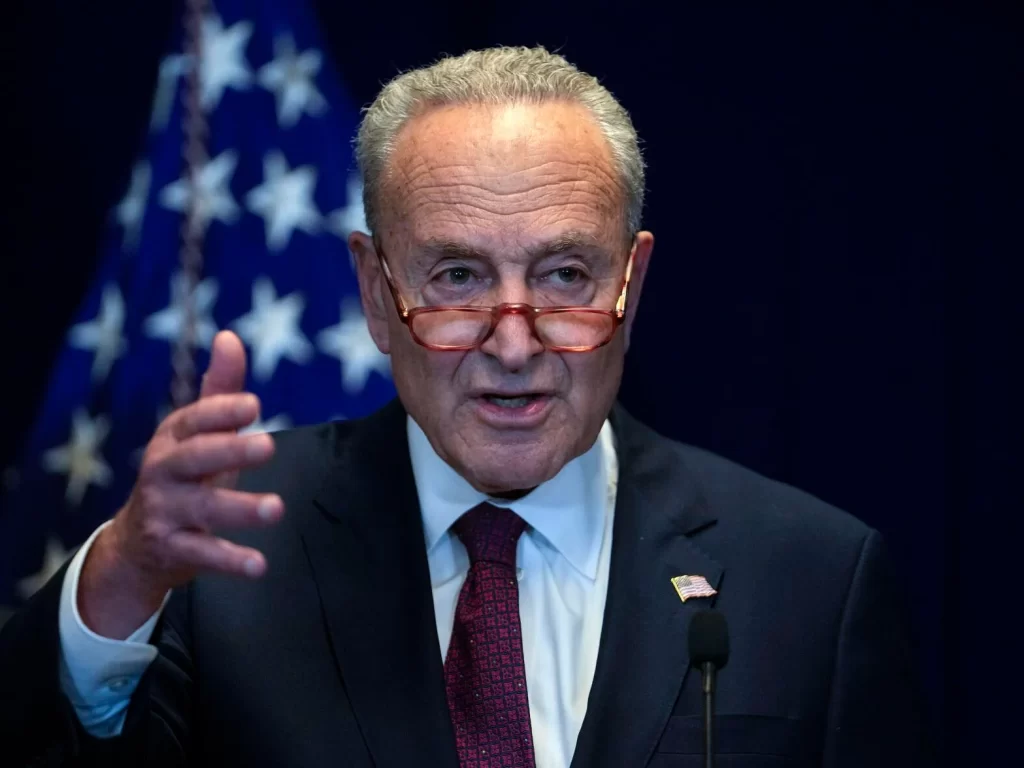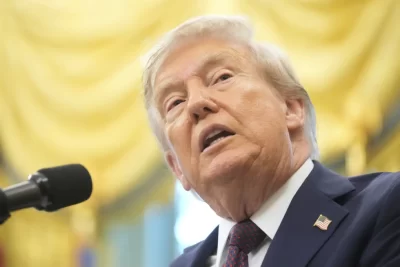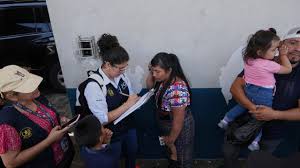
head of a trip to Israel this weekend, Senate Majority Leader Chuck Schumer says an upcoming administration request for wartime funding could include aid for both Israel and Ukraine.
Schumer — the first Jewish Senate majority leader and the highest-ranking Jewish elected official in the U.S. — is leading a bipartisan delegation of senators to Israel this weekend to express support for the country amid its week-old war against Hamas. He told The Associated Press in an interview that he wants to make clear that the United States stands with Israel and also show bipartisan support.
“To have a bipartisan delegation, led by the majority leader saying strongly and unequivocally we’re with Israel is going to make a big difference to Israelis,” Schumer said.
Republican Sens. Bill Cassidy of Louisiana and Mitt Romney of Utah and Democratic Sens. Jacky Rosen of Nevada and Mark Kelly of Arizona will also be on the trip.
Schumer also plans to discuss with high-level officials what kind of support Israel needs for both military and humanitarian operations. Those conversations will inform the White House request to Congress and what the Senate does after he returns, Schumer said, and how quickly he moves to try and pass new spending.
“I think the general view is that Israel and Ukraine will be part of it,” he said of an eventual White House request for foreign aid. “Other possibilities are something for Taiwan, and something on border, but the border stuff has to be bipartisan.”
Senate Republican Leader Mitch McConnell has also indicated that he wants war aid for the two countries tied together, along with aid for Taiwan.
Schumer’s trip, and early talks about a spending bill, comes as the politics of an impending foreign aid package are increasingly complicated. There has been growing Republican opposition to additional aid for Ukraine’s lengthy war and defense against Russia, and vocal criticism from some Republicans that the U.S. should focus more on its own problems. Added border money would be an incentive for some conservatives who have balked at spending more money for Ukraine, though aid to Israel after the brutal siege by Hamas over the weekend is expected to have much broader support.
In addition, House Republicans are embroiled in a messy fight over who will replace ousted Speaker Kevin McCarthy, and are not able to move any legislation until that is resolved.
“There’s so many crises going on, I hope they can straighten themselves out over there,” Schumer said of the House.
Administration officials have been speaking with lawmakers about the contours of a supplemental aid package as it continues to determine Israel’s needs. White House aides were meeting with a bipartisan group of House members Friday afternoon and also briefing senators remotely.
Schumer said that his trip to Israel is deeply important to him not only because of his standing as the top Jewish U.S. elected official but also because of his own heritage. His great-grandmother and several of her children were killed by Nazis in Europe.
“This has deep resonance to people,” Schumer said. “Because we have not seen anything as vicious and nasty as this since the Nazis.”
Schumer is expected to meet with Prime Minister Benjamin Netanyahu, President Isaac Herzog and senior opposition figure Benny Gantz, who is part of a newly formed wartime cabinet in Israel.
Two other high-ranking officials, Secretary of State Antony Blinken and Defense Secretary Lloyd Austin, have visited in recent days.
Schumer just this week returned from a trip to China, where he pressured officials to condemn the brutal attack on Israel by Hamas. He had just arrived there last weekend when Hamas carried out the series of surprise attacks on Saturday morning.
More violence is expected in the region. The Israeli military directed some 1 million civilians to evacuate northern Gaza “for their own safety and protection,” ahead of a feared Israeli ground offensive. Gaza’s Hamas rulers responded by calling on Palestinians to “remain steadfast in your homes and to stand firm” against Israel.
___
Associated Press writers Seung Min Kim, Kevin Freking and Farnoush Amiri contributed to this report.





